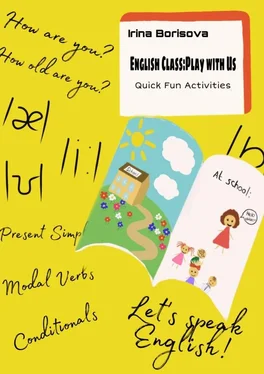People/characters involved:
– The teacher acts as a presenter and possibly as a participant
– All the students are the contestants
Procedure: The teacher writes/types adverbs ending in -ly and a sample poem on the board and explains the rules of the contest to the students. The students have seven minutes to write a poem (one or two verses) using adverbs from the list and any others. Then they read their poems out. Finally, the class decides whose poem is the best.
Example:
Adverbs
Slowly, quietly, tragically, angrily, carefully, carelessly, nervously, urgently, lovingly, suddenly, lazily, peacefully, heavily, really, immediately, nearly, finally, incredibly, loudly, eventually, hysterically, desperately, fortunately, unfortunately, warmly, happily, fondly, luckily etc.
Sample poem
She was watching them carefully —
They were yawning lazily,
She asked them a question angrily —
They looked away nervously…
They were talking to each other loudly,
She tried to stop them desperately…
They were sitting quietly,
She laughed hysterically…
Some of them were sleeping peacefully,
Others were using their phones carelessly…
She sighed and gazed at them lovingly,
She started again patiently…
In the end, they smiled at her warmly,
So, the lesson ended happily.
Some helpful ideas: It seems to be a nice idea to award a little prize to the best poet of the group.
Core language: The class vocabulary
Level: Intermediate – advanced
Number of students: Any
Stuff needed: A white/blackboard
Time: 10 minutes
People/characters involved:
– The teacher acts as a presenter and possibly as a participant
– All the students are participants
Procedure: The teacher writes/types a list of words and phrases that need revising on the board. One of the students thinks of an item from the list and, without saying it, gives a definition of that item. The rest of the group guesses which word/ phrase has been chosen. The participants take it in turns to define the vocabulary items. At the end, the students may vote for the best definition justifying their decision with reasons and comments.
Example:(from a text about roller coasters, intermediate level)
An amusement park
exhilarating
anticipation
a pendulum ride
suspended
weightlessness
motion
a roller coaster
gravity
glimpse
Student A : A railway track at a fairground with lots of steep slopes and sharp bends where people ride in fast trains.
Student B : A roller coaster!
Student A: That’s right. It’s a roller coaster.
Student C : It is an adjective which means making someone feel very excited or elated.
Student D : Exhilarating!
Student C : Yes, that’s correct. The word I mean is «exhilarating».
…
Variations: Apart from definitions, the students can also explain the chosen item in some other way. For instance, they may use phrases like «It is something that…”, «It is a place where…» or «It is a person who…»
Core language: Depends on the specific task as the game covers a wide range of language material
Level: Beginners – advanced
Number of students: Any
Stuff needed: A white/blackboard, the task cards from Appendix 1: Forfeits
Time: 20 minutes
People/characters involved:
– The teacher acts as the presenter/game host
– All the others are participants
Procedure: The game can be played as kind of «punishment» for mistakes made by the students in a particular exercise or can just be held for fun and pleasure. The teacher lays out the task cards face down on the teacher’s table. Then he/she walks around the classroom with a bag. Each student puts into the bag one of their personal belongings. Next, the teacher pulls the students’ things out of the bag one at a time. The owner of the item approaches the teacher’s desk, picks one of the cards, reads the task aloud and performs the task to get his/her thing back.
Forfeit tasks (see also Appendix 1):
•Describe the photo in your passport.
•Choose one of your classmates and tell us when and where you met.
•Draw a new road sign and explain what it is for.
•Read the poem (the story…) as if it was an episode from a horror film.
•Make an origami from a piece of paper. Explain what it is.
•Tell us about one of your classmates without giving his/her name. The other students guess who it is. Start your sentences with the words This person…
•Tell your desk mate why he/ she should fly to Mars.
•Tell us what you would do if you were a talking biscuit…
•Answer the questions with complete sentences:
– What’s your name?
– How old are you?
– Where do you live?
– Which school do you go to?
– What’s the date today?
•Arrange the following words in alphabetical order:
tea, teacher, tree, talk, tiger
•What are the opposites of the following adjectives: big, dry, hot, rich, old, happy, low, wrong, fat, clean?
•Form compound nouns from the following words:
– alarm, cross, life, ear, time
– table, guard, ring, word, clock
•Put the words next to the correct heading (five words for each heading):
potato, plum, apple, carrot, onion, lemon, garlic, orange, banana, peas
Конец ознакомительного фрагмента.
Текст предоставлен ООО «ЛитРес».
Прочитайте эту книгу целиком, на ЛитРес.
Безопасно оплатить книгу можно банковской картой Visa, MasterCard, Maestro, со счета мобильного телефона, с платежного терминала, в салоне МТС или Связной, через PayPal, WebMoney, Яндекс.Деньги, QIWI Кошелек, бонусными картами или другим удобным Вам способом.












